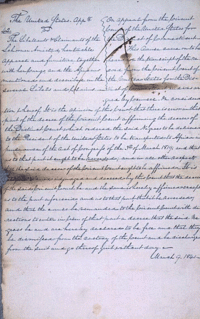This is your morning Open Thread. Pour your favorite beverage and review the past and comment on the future.
Find the past “On This Day in History” here.
March 15 is the 74th day of the year (75th in leap years) in the Gregorian calendar. There are 291 days remaining until the end of the year.
In the Roman calendar, March 15 was known as the Ides of March.
On this day in 1965, President Lyndon B. Johnson addressed a joint session of Congress to urge the passage of legislation guaranteeing voting rights for all.
Using the phrase “we shall overcome,” borrowed from African-American leaders struggling for equal rights, Johnson declared that “every American citizen must have an equal right to vote.” Johnson reminded the nation that the Fifteenth Amendment, which was passed after the Civil War, gave all citizens the right to vote regardless of race or color. But states had defied the Constitution and erected barriers. Discrimination had taken the form of literacy, knowledge or character tests administered solely to African-Americans to keep them from registering to vote.
“Their cause must be our cause too,” Johnson said. “Because it is not just Negroes, but really it is all of us, who must overcome the crippling legacy of bigotry and injustice. And we shall overcome.”
The speech was delivered eight days after racial violence erupted in Selma, Alabama. Civil rights leader Rev. Martin Luther King and over 500 supporters were attacked while planning a march to Montgomery to register African-Americans to vote. The police violence that erupted resulted in the death of a King supporter, a white Unitarian Minister from Boston named James J. Reeb. Television news coverage of the event galvanized voting rights supporters in Congress.
The Voting Rights Act of 1965 (42 U.S.C. §§ 1973 – 1973aa-6 is a landmark piece of national legislation in the United States that outlawed discriminatory voting practices that had been responsible for the widespread disenfranchisement of African Americans in the U.S.
Echoing the language of the 15th Amendment, the Act prohibits states from imposing any “voting qualification or prerequisite to voting, or standard, practice, or procedure … to deny or abridge the right of any citizen of the United States to vote on account of race or color.” Specifically, Congress intended the Act to outlaw the practice of requiring otherwise qualified voters to pass literacy tests in order to register to vote, a principal means by which Southern states had prevented African-Americans from exercising the franchise The Act was signed into law by President Lyndon B. Johnson, a Democrat, who had earlier signed the landmark Civil Rights Act of 1964 into law.
The Act established extensive federal oversight of elections administration, providing that states with a history of discriminatory voting practices (so-called “covered jurisdictions”) could not implement any change affecting voting without first obtaining the approval of the Department of Justice, a process known as preclearance. These enforcement provisions applied to states and political subdivisions (mostly in the South) that had used a “device” to limit voting and in which less than 50 percent of the population was registered to vote in 1964. The Act has been renewed and amended by Congress four times, the most recent being a 25-year extension signed into law by President George W. Bush in 2006.
The Act is widely considered a landmark in civil-rights legislation, though some of its provisions have sparked political controversy. During the debate over the 2006 extension, some Republican members of Congress objected to renewing the preclearance requirement (the Act’s primary enforcement provision), arguing that it represents an overreach of federal power and places unwarranted bureaucratic demands on Southern states that have long since abandoned the discriminatory practices the Act was meant to eradicate. Conservative legislators also opposed requiring states with large Spanish-speaking populations to provide bilingual ballots. Congress nonetheless voted to extend the Act for twenty-five years with its original enforcement provisions left intact.


 On this day in 1881.
On this day in 1881.  On this day in 1947,
On this day in 1947,  On this day in 1959,
On this day in 1959,  On 1 March 1959, an unusual invitation to attend a theatrical performance at the Chinese military headquarters outside Lhasa was extended to the Dalai Lama. The Dalai Lama, at the time studying for his
On 1 March 1959, an unusual invitation to attend a theatrical performance at the Chinese military headquarters outside Lhasa was extended to the Dalai Lama. The Dalai Lama, at the time studying for his  On 12 March, protesters appeared in the streets of Lhasa declaring Tibet’s independence. Barricades went up on the streets of Lhasa, and Chinese and Tibetan rebel forces began to fortify positions within and around Lhasa in preparation for conflict. A petition of support for the armed rebels outside the city was taken up, and an appeal for assistance was made to the Indian consul. Chinese and Tibetan troops continued moving into position over the next several days, with Chinese artillery pieces being deployed within range of the Dalai Lama’s summer palace, the Norbulingka. On 15 March, preparations for the Dalai Lama’s evacuation from the city were set in motion, with Tibetan troops being employed to secure an escape route from Lhasa. On 17 March, two artillery shells landed near the Dalai Lama’s palace, triggering his flight into exile. On 19 March the Chinese started to shell the Norbulingka, prompting the full force of the Uprising. According to the freetibet website, on 21 March 800 shells rained down on the palace, including the shelling of the Norbulingka and Lhasa’s major monasteries, slaughtering thousands of Tibetan men, women and children. Combat lasted only about two days, with Tibetan rebel forces being badly outnumbered and poorly armed.
On 12 March, protesters appeared in the streets of Lhasa declaring Tibet’s independence. Barricades went up on the streets of Lhasa, and Chinese and Tibetan rebel forces began to fortify positions within and around Lhasa in preparation for conflict. A petition of support for the armed rebels outside the city was taken up, and an appeal for assistance was made to the Indian consul. Chinese and Tibetan troops continued moving into position over the next several days, with Chinese artillery pieces being deployed within range of the Dalai Lama’s summer palace, the Norbulingka. On 15 March, preparations for the Dalai Lama’s evacuation from the city were set in motion, with Tibetan troops being employed to secure an escape route from Lhasa. On 17 March, two artillery shells landed near the Dalai Lama’s palace, triggering his flight into exile. On 19 March the Chinese started to shell the Norbulingka, prompting the full force of the Uprising. According to the freetibet website, on 21 March 800 shells rained down on the palace, including the shelling of the Norbulingka and Lhasa’s major monasteries, slaughtering thousands of Tibetan men, women and children. Combat lasted only about two days, with Tibetan rebel forces being badly outnumbered and poorly armed. On this day in 1841,
On this day in 1841, 
 On this day in 1911,
On this day in 1911,  Following the
Following the 
 On this day in 1965, a group of 600 civil rights marchers are forcefully broken up in Selma, Alabama. This day would be remembered in the Civil Rights Movement as
On this day in 1965, a group of 600 civil rights marchers are forcefully broken up in Selma, Alabama. This day would be remembered in the Civil Rights Movement as  Bevel’s initial plan was to march to Montgomery to ask Governor
Bevel’s initial plan was to march to Montgomery to ask Governor 